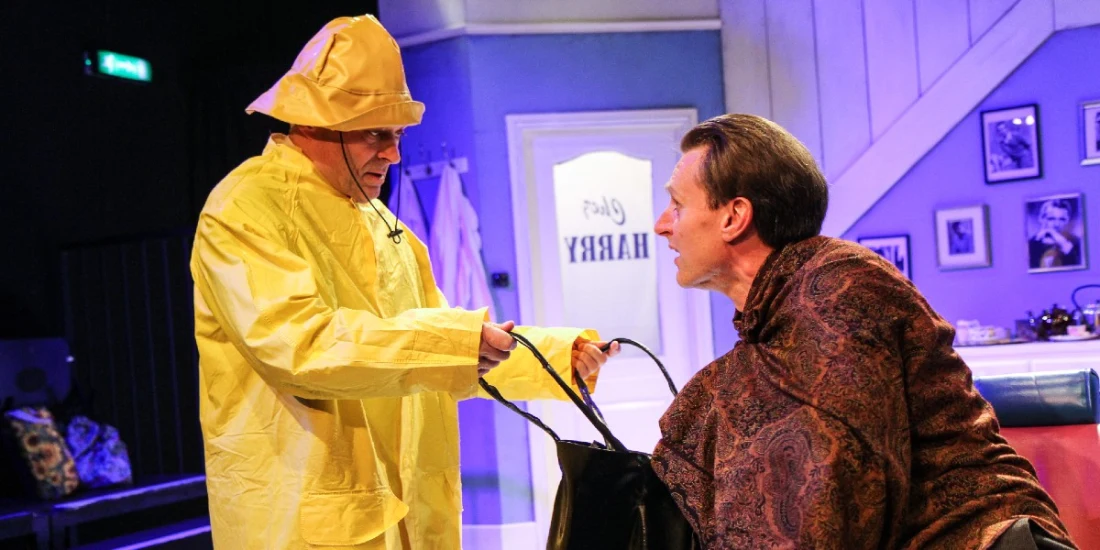'Staircase' at Southwark Playhouse struggles to find chemistry and humour
Groundbreaking, one assumes, at the time of its 1966 Royal Shakespeare Company premiere, this two-hander from Charles Dyer (who died at the start of this year, age 92) is best seen as a theatrical curiosity. Written a year prior to the decriminalisation of homosexuality in England, Dyer's two-hander feels in Tricia Thorns' production like something of a precursor to Vicious, the British sitcom that locked Derek Jacobi and Ian McKellen as an elderly couple locked in a cycle of perpetual bitchiness and sparring.
The pairing on view here are Charlie Dyer (John Sackville) - the character has the same name as his playwright - and Charlie's older, and balding, lover, Harry C Leeds (Paul Rider): the two names are anagrams of one another, presumably suggesting their deep-seated symbiosis. Charlie, some 20 or more years ago, fathered a daughter, Cassie, who is due for a visit at the south London hairdresser where the two men run a business and live with Harry's (unseen) mum upstairs. Cassie's much fretted-about arrival isn't shown; what very much is laid bare is the gathering panic felt by Charlie, a onetime actor whose career is on the skids (he's been doing duffel coat commercials) and who is facing his day in court for having dressed in drag and sat on a man's knee in public. Harry, meanwhile, obsesses about his bandaged head, announcing rather improbably that he would face the law 10 times over if only he could have Charlie's full complement of hair.
Handel's "Hallelujah" chorus heard at the start morphs later in the play into the "Alopecia" chorus, if you please, while Charlie snaps "Hilaire Belloc" at Harry - the Anglo-French writer an arcane reference, to put it mildly. Along the way, slurs get thrown this way and that: "pregnant hen" one minute, "twisted bitch" the next. Photos on the wall of Alex Marker's beautifully detailed barber shop set include stills of Marlon Brando and Clark Gable, these celluloid glories there to contrast with the diminished, desperate lives on view before us: one clocks the two men after 20 years together enmeshed in a shared verbal sabotage while doing battle with the larger societal disgust that exists just beyond their front door.
Peter Hall's first production of Staircase starred Paul Scofield and Patrick Magee, an intriguing duo if ever there was one, while Stanley Donen was at the unexpected helm of a subsequent film version with Rex Harrison and Richard Burton that did a fast fade. The problem here is one of tone: at least as of press night, the actors haven't yet found a way to lighten the bitchery so as to allow glimpses of the affection that has seen them through bumps before and will surely do so again. You also feel as if the whole could be funnier than it is. Of the two, Sackville might usefully modulate Charlie's anxious vanity so as to make his self-doubt less wearing on an audience.
Rider does better, the performer adroitly shifting gears following several stints as Amos Hart in the musical Chicago. While Charlie bangs on about his erstwhile artistry, we watch as Rider's Harry on occasion lets slip a barely suppressed ferocity. You feel the price paid for a life described as "sordid," and when Harry talks about how nice it might have been had he been able to have a child, you note - and not for the first time - the chasm between mores and attitudes of a half-century or more ago and our own imperfect if clearly more accepting time. Not so much a staircase, in fact, between then and now as an ongoing travelator on the way toward tolerance.
Photo credit: Paul Rider and John Sackville (Photo by Phil Gammon)
Originally published on
